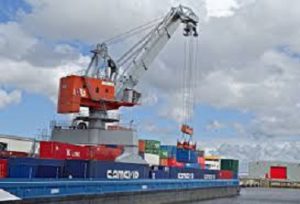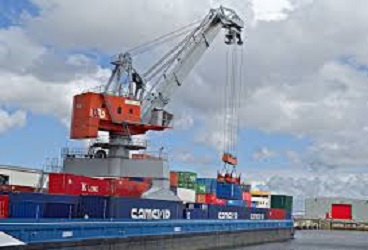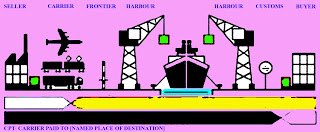Abstract
Supply Chain managers have to handle the risks that the particular supply chain faces. Some risks emanate from the third party suppliers and logistic provider side, who are engaged to fill up some requisites of the supply chain and consumers. The purpose of this paper is to take a step back and look at what third party risk really means in supply chain operations, and what it can do for you—based on real world problems—along with an outline of the conditions. We are not offering a simple one step application, nor are we trying to debunk the concept. We intend to show how third party supply chain risk affects a supply chain and how to solve them. It is the means to achieve true supply chain responsiveness and effectiveness, increase the supply chain value. In keeping with the notion of vision, supply chain risk issues need to be contained as much as possible. It’s where we are going. This discussion illuminates the path to continuous decision-making that allows truly effective, agile supply chain operations. It is the ability to know about the risks and taking necessary measures, and it is the result of the availability of data and the ability to use it. When you have visibility you can take reliable information that is relatable into action. You need the correct tools to collect that data. And, you need integration within your own organization and with your third party suppliers.
Keywords: Third party suppliers, supply chain management, Risks, Solutions
Introduction:
Third party risk related issue is not a new concept. In fact, it has been a topic of discussion and research by global supply chain management experts for several years. Third party risk related problems you can usually handle, for example, through some actions, like you can get papers on the geographic location of your provider , allowing you to respond more effectively to location particular events such as natural cataclysm , terrorist threats or political and economic unstableness . To provide even greater rigor we can apply a Financial Risk Assessment to selected suppliers to provide you with a more in-depth view of their financial profile. This way you can find the third party risk related problems and try to solve them. The purpose of this paper is to find major problems and find some credible solutions for supply chain managers and CEOs. Based on our study and conclusion, further study is still welcome for supply managers.Hope this paper will help you to get more information throw pointing at third party risks of supply chain management in the problem section and getting solutions in solution section in detail.
Revenue related risks and problems:
Usually a third party supplier’s financial capability can affect the business of the buyer, who has a contact with them. The business world is mostly small business inhabited. Even in USA 99% of the businesses are small business. In the background they may have demeaning, or problems with principals. Even big third party companies sometimes fallin financial bankruptcy, e.g. Hanjin Shipping had fall into financial demise in 2017. A third party should be cost efficient for a business. The third party logistic company’s financial aspects are characterized by two types. They are either resource suppliers e.g., asset and management based, integration service based or product suppliers, such as, spare-parts, final product suppliers. Balance sheet, access to capital resources are important criteria of third party suppliers.
Problems regarding compliance and reputation:
Supply Chain compliance in global arena is very active now a days. Sometimes a third party’s compliance of environment or other stakeholders are not known to a business. A third party’s non-compliance may hit the buyer. To avoid supply chain compliance risk, a company should have the capacity to scan the horizon for new and emerging requirements. National and regulatory requirements, industry requirements, bilateral and multilateral trade agreements, internal corporate policies, contractual requirements, customer requirements etc. Sometimes, third party supplier’s certificate of compliance is not reliable without independent validation. For compliance management skills it is required by most people to depend on senior compliance professionals. So many organizations has been evolved and created to see compliance issues. Each organization has its own goals, internal supply chain mechanism and competitive supply chain strategy. Which may not supportive to the first party, who engage them and makes contract to some extent and create financial, compliance or reputational issues. These are the main reasons of third party supply chain risks.
Suppliers oversee some of the the important things of the 1st party:
The reputation of the third party and partners is very important for the first party, because it reflects on its own reputation and credibility. You may also want to interview the owner and managers of the third party that would oversee your relationship to important issues to make a sense of how they operate and whether they have the capacity to handle the volume and complexity, so that your people feel comfortable. You also want to tell them that it’s strictly against your company policy to pay off government officials or businesses. You have to associate andmost importantly, watch the third party’s response throughout your discussion. It is mentionable that top third party risks in emerging markets are as follows: Corruption-69%, bribery-58%, political instability-33%, lack of instability: 18%.The Solution Companies have been working with suppliers, outsourcers, licensees, agents, and the like for years. What has been transmuted, however, isthe frequency and scale of third-party use and the regulatory fixate on how organizations are managing third parties to address the solution.

Bribery and corruption related issues:
Too many organizations are unintentionally open to risks such as bribery and corruption from their suppliers, distributors, logistic service providers, agents and other third parties. Carrying out thorough third party audit not only provides the necessary regulations, but it also helps mitigate against reputational financial risk and data related damage.It is required to be careful about various governmental embargo situation: Third party suppliers, logistic service providers should prevent themselves from buying from or selling to anyone on the relevant restricted company lists maintained by various governments, such as Australia, Canada, the UK and the US. Various department of the US government, for example, maintain lists of country, company and someone that constitute potential terrorist terror, such as the US Exchequer Department’s specially designated nationals listing. The Atomic number 63 maintains a similar list of designated entities and individuals called the EU Consolidated List of Financial Authorization Target area, which applies to all EU states. Once you agree on a liability limit, you should also make sure the third party has the means to pay it if something does happen. It is required to be careful about partner’s partner: Depending on how many subcontractors your third-party supplier/partner body of piece of works with, you may want to include a provision that gives you the right to approve the subcontractor that work on your project and require them to provide year book updates on who those subcontractor are. If you know who your supplier’s provider are will help you manage your risk. Create a detailed loss program. The agreement will often stipulate that the passing plan will be written within early execution of the contract, but later, when something goes wrong and you go looking for it, International Relations and Security Networks are there. If they work with subcontractors, it may be more feasible to advise you whenever a subcontractor is involved in legal issues.
Solution for ending a contract arrangement:
If you are in trouble about not being paid for production, while you’ve already provided to one of your distributors, franchisees or gross revenue agents who then file for creditor security, you can build protection mechanism into your contracts. Use professional legal translators. A common mistake that businesses make when expanding into new markets is using contracts governed by their own local laws without being sure about those terms, whether they will be enforceable in the legal power where businesses will be conducted. You should know that when bill of lading stock would be housed in your warehouse in a specially designated area, it wouldn’t become yours until you wage for it. Getting a win-win situation in a contract: There are a plethora of deals where there has been way an exorbitant amount of arguing and not enough of that kind of ‘win-win’ discussion. Keep your contracts current. Trade regulations and commerce laws are always transmuting so you require to periodically review statutory and other local requisites to ascertain the terms of your contracts comply with current international and local laws, rules and regulations. This approach can additionally accommodate you well during pricing negotiations by availing to facilitate the fundamental tension between your objective top reserve money by outsourcing a particular function and the provider’s desire to make money on that business.The problems mentioned above are based on real world problems. And the solutions are also applied by supply chain leaders in the real world.
Conclusion:
Third party supply organizations are engaged to do some functions or supply some of the materials or finished goods. But third party organizations pose some risks that are of financial, compliance or reputational nature. They can be solved by checking each part of the problems, being aware of the partners’ partner, solving end of a contract related issues, making a contract with a win-win discussion. Taking help of legal professionals can help to make contract with reasonable legal conditions. It is true that all countries are not abide by same laws. Both parties should remember it. When businesses and supply chains go to have an agreement, executives need to remember the problems and solutions. Also their unique competitive supply chain strategy. This paper fixate on having an effect in the world, such as making your products, accommodations, or a company looks good; avail our people understand, do something well, raising cognizance of an issue. Hope that this paper will avail supply chain managers to have an indispensable fixate on third party risk cognate issues to a great extent.
References
1.https://www2.deloitte.com/content/dam/Deloitte/us/Documents/consumerhttps://www2.d
eloitte.com/content/dam/Deloitte/us/Documents/consumer-business/us-cp-supply-chain-riskcompliance.
pdfbusiness/us-cp-supply-chain-risk-compliance.pdf
2. https://www.tuv.com/bangladesh/en/mastering-risk-compliance.jsp
3. https://www.google.com/search?q=Handout-2-The-
Companies&oq=Handouthttps://www.google.com/search?q=Handout-2-The-Companies&oq=Handout-2-
The-Companies&aqs2-The-Companies&aqs
4. https://www2.deloitte.com/au/en/pages/risk/articles/third-party-risk.html
5.https://www.kellyocg.com/thought-leadership/the-emerging-threat-ofsupplyhttps://
www.kellyocg.com/thought-leadership/the-emerging-threat-of-supply-chain-risk-in-financialservices/chain-risk-in-financial-services/






